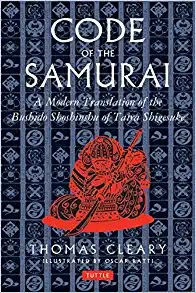In a time of peace, at the end of the Tokugawa regime (1603-1867), the Samurai extended their duties into the administrative class, developing from mere 'attendants' to philosophers, scholars, physicians, and teachers, creating concise systems of mental and moral training. This class influenced the country's culture in profound ways, which continues to be felt and seen in modern day Japan.
Fearing
that the Samurai would lose their basic purpose and essential
character, author Taira Shigesuke, (1639-1730) a Confucian scholar,
wrote this handbook for the novice knight. For the beginning knight,
this book would have been indispensable, in terms of conducting
oneself in the true spirit of the Samurai.
The
book is structured in three parts, including subjects ranging from
education, familial duty, frugality, courtesy and respect, laziness,
discretion to military service, vassalage and loyalty to dealing with
one's superiors. What is so valuable about this book for the modern
western reader is that it provides age-old ethical guidelines that
are exceedingly practical and relevant to the present day.
Central
to the Samurai philosophy is the notion of concerning oneself daily
with death. Shigesuke emphasises from the outset, that, "As long
as you keep death in mind at all times, you will also fulfil the ways
of loyalty and familial duty." In other words, everything else
follows from this basic attitude - a long life, and a character that
will improve and virtue that will grow. This makes sense, of course,
because as the author points out, when you think your time here will
last, you're inclined to take it for granted, thereby saying things
you shouldn't say and letting important matters slide because "...it
can always be done tomorrow."
This powerful little book is as compelling and relevant as it was over 400 hundred years ago. It will not take more than an hour to read, but its contents hold treasures that should be referred back to in order to remind one that life is short and should never be taken for granted. This book is also recommended to students of Asian studies as it provides a fundamental understanding of Japanese culture.





No comments:
Post a Comment